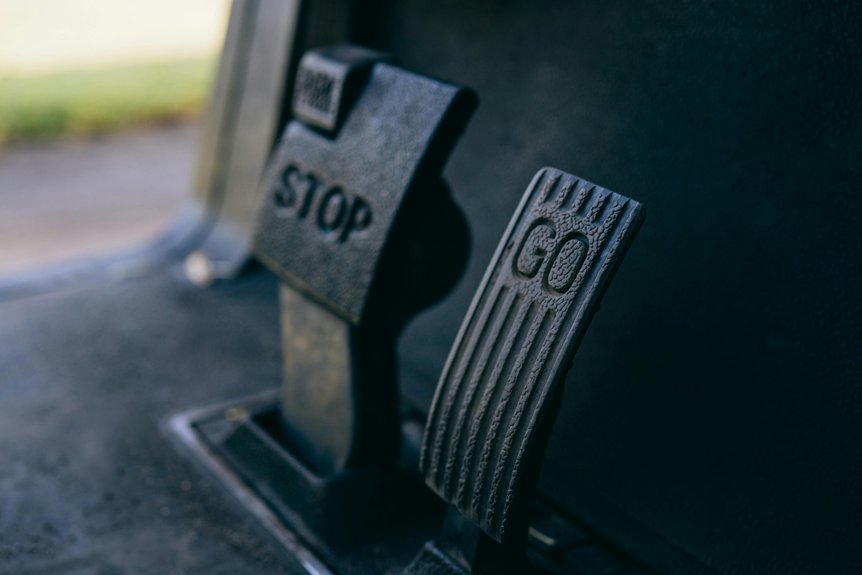As a first-time car owner, understanding how your vehicle’s transmission works is vital for smooth driving and avoiding costly repairs. Whether you have a manual or automatic transmission, knowing the basics can help you maintain your car properly and recognize early signs of trouble. Keep in mind that proper handling and regular checks can extend your transmission’s life, but knowing when to seek professional advice is equally important. Keep going to learn more about keeping your transmission in top shape.
Understanding Your Vehicle’s Transmission Types
Understanding your vehicle’s transmission types is essential for making informed driving decisions and proper vehicle maintenance. If you’re driving a manual, mastering clutch operation is vital for smooth gear shifting techniques. The clutch engages and disengages the engine from the wheels, allowing you to change gears efficiently. Proper gear shifting techniques involve pressing the clutch fully, shifting gears smoothly, and releasing the clutch gradually. Knowing how your transmission works helps prevent unnecessary wear and tear, ensuring your car runs smoothly longer. Additionally, understanding the importance of transmission repair and maintenance can help you identify early signs of issues and seek professional assistance when needed. Whether manual or automatic, understanding these basics empowers you to operate your vehicle confidently and maintain its best performance.
Recognizing the Signs of Transmission Problems
Detecting transmission problems early can save you from costly repairs and breakdowns. One key sign is the transmission fluid color; if it turns dark or smells burnt, it indicates contamination or overheating.
Another warning is transmission slipping, where your car unexpectedly shifts gears or struggles to accelerate. You might notice delays or jerks during gear changes.
Unusual noises, such as whining or clunking, also signal issues. Pay attention to these signs, as addressing them promptly can prevent further damage.
Regularly checking your transmission fluid and being alert to these symptoms helps keep your transmission running smoothly.
The Importance of Regular Transmission Fluid Checks
Regularly checking your transmission fluid is essential to keep your car shifting smoothly and prevent costly repairs. Low or dirty transmission fluid can cause rough shifts, slipping, or overheating.
To check fluid levels, park on a level surface, locate the transmission dipstick, and verify the fluid is within the recommended range. If the fluid appears dark or has a burnt smell, it’s time for a fluid change.
Maintaining proper transmission fluid levels helps your transmission operate efficiently and extends its lifespan. Make checking your fluid a routine part of vehicle maintenance to catch problems early and keep your car running reliably.
How to Properly Use Your Transmission System
To guarantee your transmission operates smoothly and lasts longer, it’s essential to use it properly. Start by mastering clutch adjustment; ensure your clutch engages smoothly without slipping.
Use gentle gear shifting techniques—avoid forcing the gear lever or rushing shifts—to prevent unnecessary wear. When shifting, press the clutch fully, shift gears smoothly, and release the clutch gradually.
Keep your hand steady on the gear shift, and don’t rest your hand on the stick to avoid added pressure. Proper clutch adjustment and mindful gear shifting techniques protect your transmission, reduce damage, and improve driving comfort, ensuring your vehicle performs reliably for years to come.
Tips for Extending the Life of Your Transmission
Maintaining proper transmission habits can markedly extend its lifespan and keep your vehicle running smoothly. Regularly check and change transmission fluid, paying attention to different transmission fluid types recommended for your car. Using the correct fluid prevents wear and overheating.
If you have a manual transmission, ensure proper clutch adjustment; a well-adjusted clutch reduces strain on the transmission and prevents slips. Avoid aggressive driving and abrupt shifts, which can cause unnecessary wear.
Keeping your transmission well-maintained with fresh fluid and proper clutch adjustment helps prevent costly repairs and ensures your vehicle runs reliably for years to come.
When to Seek Professional Help
Knowing when to seek professional help for your transmission can save you from costly repairs and prevent further damage. If you notice slipping gears, delayed engagement, or difficulty shifting, it’s time to consult a mechanic.
Regular transmission fluid replacement is essential; if the fluid appears dark or smells burnt, don’t delay a professional inspection.
Clutch adjustment issues, like slipping or sticking, also signal the need for expert attention.
Addressing these problems early can preserve your transmission’s health and avoid expensive repairs down the line.
Trust a professional to diagnose and fix issues accurately, ensuring your vehicle runs smoothly and reliably.
Basic Maintenance and Troubleshooting Tips
Regularly inspecting and caring for your transmission can prevent many common issues before they become costly repairs. Start with clutch adjustment if you notice slipping or difficulty shifting, as proper clutch engagement is essential.
Check your transmission fluid regularly; using the correct transmission fluid types ensures smooth operation and prevents damage. Keep an eye out for leaks or burning smells, which signal fluid problems.
If shifting feels rough or delayed, it might indicate low fluid or a need for fluid replacement. Staying proactive with these basic maintenance and troubleshooting tips helps extend your transmission’s lifespan and keeps your driving smooth and safe.
Conclusion
Taking care of your transmission ensures smooth driving and saves you money in the long run. Regularly check your fluid, practice gentle gear shifts, and stay alert for signs of trouble. Don’t hesitate to seek professional help if you notice any issues. To schedule your free TransScan or to book an appointment, call us today at (919) 471-2506 or visit us online at Durham Transmission. By staying proactive and attentive, you’ll keep your transmission in top shape, helping your first car ownership experience be safe and hassle-free. Remember, proper maintenance makes all the difference.

